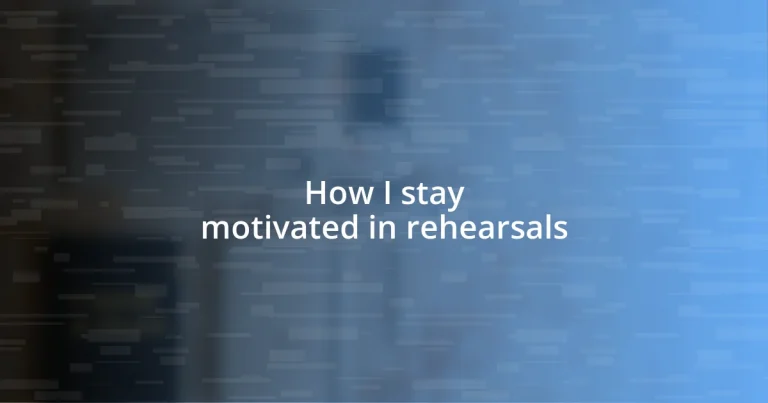Key takeaways:
- Setting clear rehearsal goals enhances focus and transforms practice into purposeful sessions, allowing for measurable progress.
- Finding personal motivation through reflection and connection with fellow performers fosters engagement and reinvigorates passion for the craft.
- Celebrating small achievements creates a positive atmosphere and reinforces the value of progress, making the rehearsal journey enjoyable and rewarding.
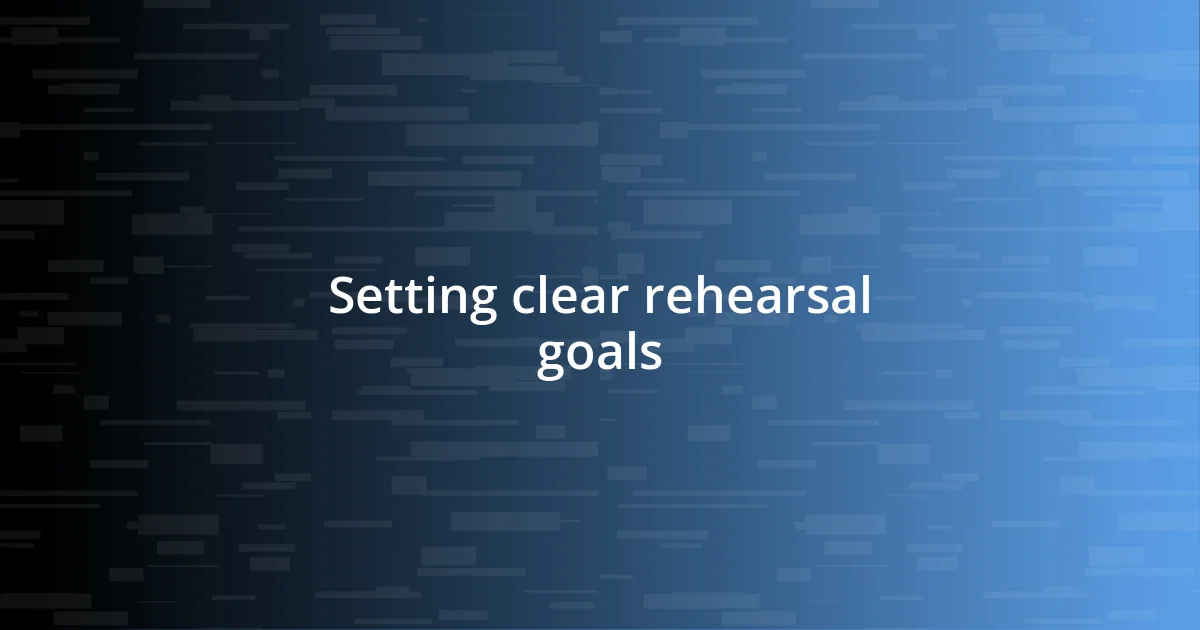
Setting clear rehearsal goals
Setting clear rehearsal goals transforms a seemingly endless cycle of practice into purposeful, focused sessions. I remember feeling overwhelmed during a particularly demanding production, where the sheer volume of material made it easy to lose track of what I was trying to achieve. By breaking down my rehearsal into manageable, clear goals—like mastering a specific scene or perfecting my timing—I felt a newfound sense of direction and accomplishment.
Have you ever walked into a rehearsal with no idea what you wanted to achieve? I’ve been there, too. During one chaotic rehearsal, I realized that setting a specific goal—like improving my vocal projection—kept me engaged and more energized. This simple change shifted my perspective; I found myself actively working toward something rather than just going through the motions.
When goals are clear and measurable, it creates a roadmap for development. After I started using this approach, I discovered I was not just practicing to practice—I was genuinely improving. Every small win, from hitting a high note to perfecting a gesture, became a marker of progress. Isn’t it rewarding to celebrate those victories, one rehearsal goal at a time?

Finding your personal motivation
Finding the driving force behind your motivation can sometimes feel elusive. For me, understanding what truly ignites my passion is crucial. I recall a challenging rehearsal series where I felt fatigue creeping in. It was only when I reflected on why I love performing, the thrill of connecting with the audience, that I found my spark again. That realization transformed my approach; instead of trudging through the process, I engaged with the material because I genuinely believed in its power to move people.
To make the most of your motivation, consider these strategies:
- Identify what excites you about your role or the production.
- Reflect on past performances that made you feel proud and energized.
- Connect with fellow cast members; their enthusiasm can be infectious.
- Visualize your success and the impact your work will have.
- Keep a journal to track your thoughts and feelings about rehearsals—recalling why you love this craft can reignite your passion.
Finding personal motivation isn’t a one-size-fits-all journey. Instead, it’s about unlocking what makes your heart race and keeping that flame alive through every rehearsal.
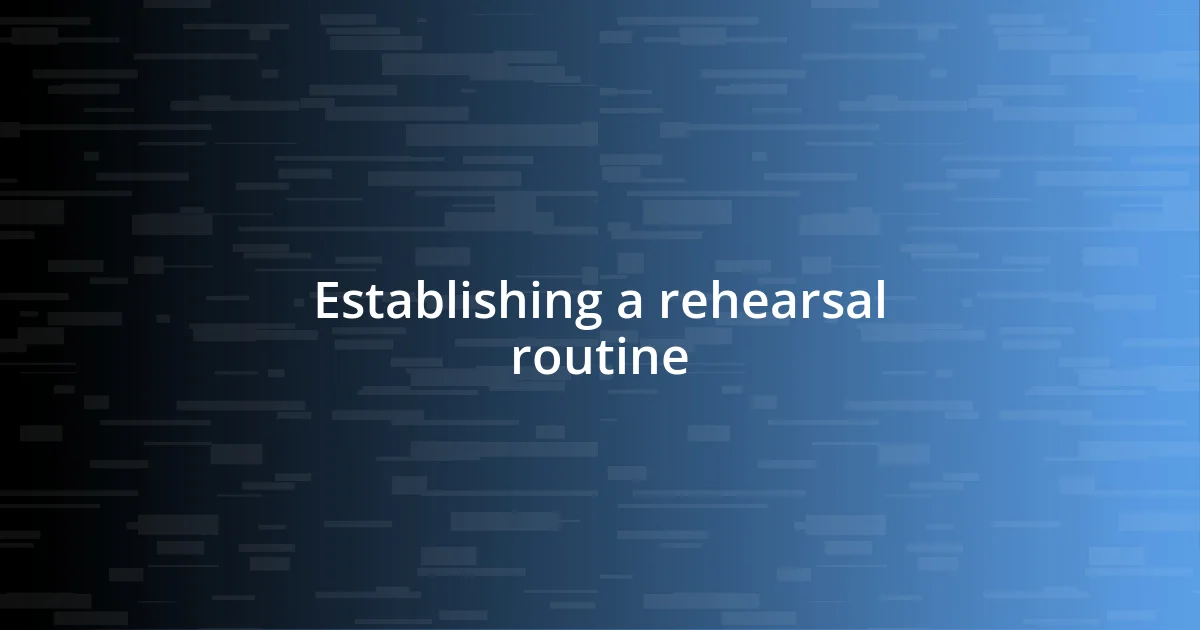
Establishing a rehearsal routine
Establishing a rehearsal routine is one of the best ways to ensure you stay focused and motivated. I remember when I first tried to create consistency in my rehearsal schedule; it felt transformative. By dedicating specific times for practice, I noticed that my mind became accustomed to the rhythm of preparation. Each rehearsal turned into a sacred time that I eagerly anticipated, creating a space where I could refine my skills without distraction.
I find that flexibility in routine is just as important as structure. While it’s great to have set days and times, being too rigid can lead to burnout. For example, there were times when I felt overwhelmed, and adjusting my routine to include shorter, more intense practice sessions helped me stay engaged. I often replace a two-hour rehearsal with 30 minutes of focused work on challenging material and then use some downtime for reflection. This approach keeps my enthusiasm high, allowing me to dive deeply into the work without feeling drained.
Establishing a consistent rehearsal routine also helps build camaraderie among cast members. When we all commit to practicing together, it creates a sense of accountability. In one of my recent productions, we set aside a weekly meeting to recap our progress and share quick tips. It didn’t just improve our individual performances; it fostered team spirit, making each of us feel more connected and invested. Isn’t it incredible how the structure of routine can enhance not only personal motivation but also relationships within the group?
| Routine Aspect | Benefits |
|---|---|
| Consistency | Helps create structure; prepares the mind for focused work. |
| Flexibility | Prevents burnout; allows for tailored practice sessions based on personal needs. |

Incorporating positive affirmations
Incorporating positive affirmations into my rehearsal process has been a game-changer. Every morning, I take a moment to speak affirmations aloud like, “I am a talented performer, and I bring my characters to life.” It might sound simple, but when I hear those words, they resonate deeply within me. They remind me that I possess the skills to shine on stage, transforming any self-doubt into a powerful motivation. Have you ever tried affirming your strengths? It can completely shift your mindset.
During tough practices, I often write affirmations on sticky notes and place them around my practice space. I remember a particularly grueling rehearsal where I struggled with my lines. Instead of getting frustrated, I read my affirmations aloud, like, “Mistakes are part of the learning process,” and watched my anxiety fade away. It was a gentle reminder that progress, not perfection, is what truly matters. Why not give it a try during your next rehearsal and see how it feels?
By consistently integrating affirmations into my routine, I’ve noticed a profound impact on my confidence. It’s like having a personal cheerleader on my shoulder. Whenever I encounter challenges, I recite things like, “I embrace every challenge as an opportunity to grow,” and suddenly, those obstacles feel manageable. Have you thought about how powerful a simple phrase can be in igniting your enthusiasm? This small practice has opened doors to a more positive rehearsal experience, reinforcing my belief that I’m capable of achieving great things.

Engaging with fellow performers
Engaging with fellow performers takes rehearsals to another level. I remember a session where a simple game of improvisation sparked laughter and creativity among us. We were tackling some heavy material, and breaking the ice like that not only lifted our spirits but also strengthened our chemistry on stage. Have you ever noticed how a bit of fun can shift the mood in a rehearsal?
It’s amazing how sharing insights during a rehearsal can deepen our understanding of the material. I often find myself exchanging thoughts with my scene partners, discussing character motivations or emotional arcs. Just last week, one of my teammates pointed out a subtle nuance in my performance that I hadn’t considered. That moment of collaboration fueled my motivation and enriched my performance. Isn’t it rewarding when we learn from each other?
Creating an environment where everyone feels comfortable to express their ideas is essential. I’ve experienced rehearsals where open discussions led to groundbreaking discoveries about our characters and scenes. When someone shares their interpretation, it opens a doorway to explore new depths in our work. Have you ever had that “aha” moment during a group discussion? It’s these connections that remind me how powerful teamwork can be in keeping us motivated and engaged.
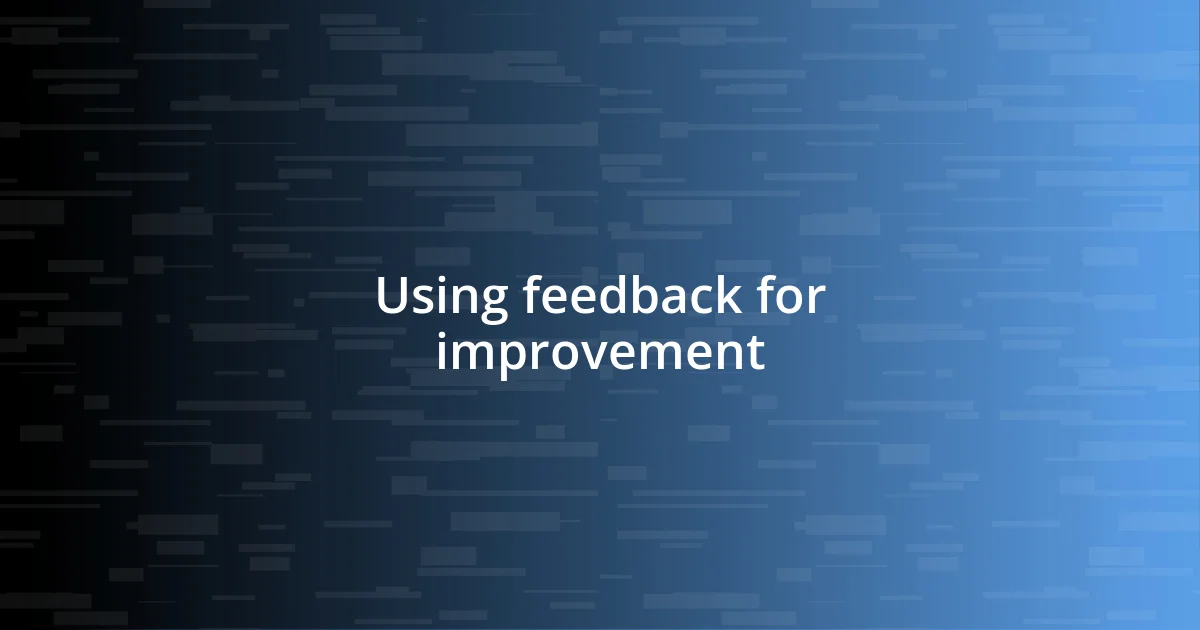
Using feedback for improvement
Using feedback in rehearsals can be one of the most transformative experiences. I still remember a time when I received constructive criticism from my director during a run-through. Instead of feeling discouraged, I approached it as a chance to refine my craft. Do you ever feel that initial sting of feedback? I realized that embracing these moments not only sharpened my skills but also reignited my enthusiasm for the character I was portraying.
What truly stands out for me is how feedback can lead to unexpected discoveries. After a particularly challenging rehearsal, a fellow actor pointed out that my emotional delivery felt a bit off. It wasn’t easy to hear, but I took a step back and revisited my approach. When I returned with a fresh perspective, I found layers to my character I hadn’t noticed before. Have you ever had to re-evaluate your performance based on someone else’s insight? It can be a revelation, as it encourages a deeper connection to the material.
Incorporating feedback doesn’t mean accepting it blindly; it’s about filtering it through your own artistic lens. I’ve learned to ask clarifying questions when receiving feedback. For example, after a performance, I often ask, “What specific moments stood out to you, and how can I enhance them?” This way, I ensure that the feedback is constructive and actionable. Isn’t it fascinating how a simple conversation can lead to significant growth? I truly believe that the key to improvement lies in this dialogue, keeping our motivation alive and pushing us toward excellence.
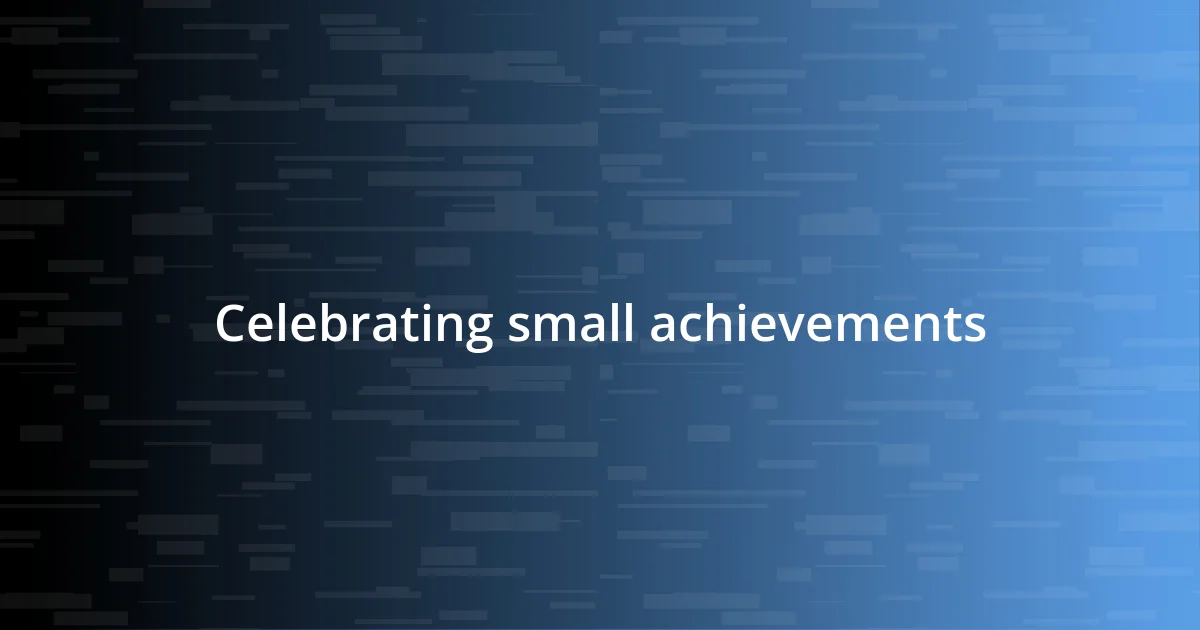
Celebrating small achievements
Celebrating small achievements during rehearsals can have an incredible impact on our motivation. I fondly recall a rehearsal where, after finally nailing a complex scene, my fellow cast members and I took a moment to acknowledge that tiny victory. The high-fives and cheers ignited a renewed energy in the room. Have you ever felt that surge of positivity after recognizing a small success? It’s those little moments that create a sense of camaraderie and make the process enjoyable.
Every time I master a vocal technique or deliver a line just right, I make it a point to celebrate it, no matter how minor it seems. I remember during one rehearsal, I successfully executed a tough breath control exercise that I’d struggled with for weeks. To mark the moment, I treated myself to a favorite snack afterward. Little rituals like this make the journey more rewarding and remind me how far I’ve come. Isn’t it all about finding joy in the small victories?
Reflecting on these achievements allows me to stay deeply connected to my progress. I often jot down my small wins in a rehearsal journal, which I flip through when I need a motivational boost. The act of writing it down transforms fleeting moments into cherished milestones. Have you considered how tracking your achievements can provide clarity and motivation? It’s these records that remind me that every small step is part of a larger journey, fueling my passion for the craft.












